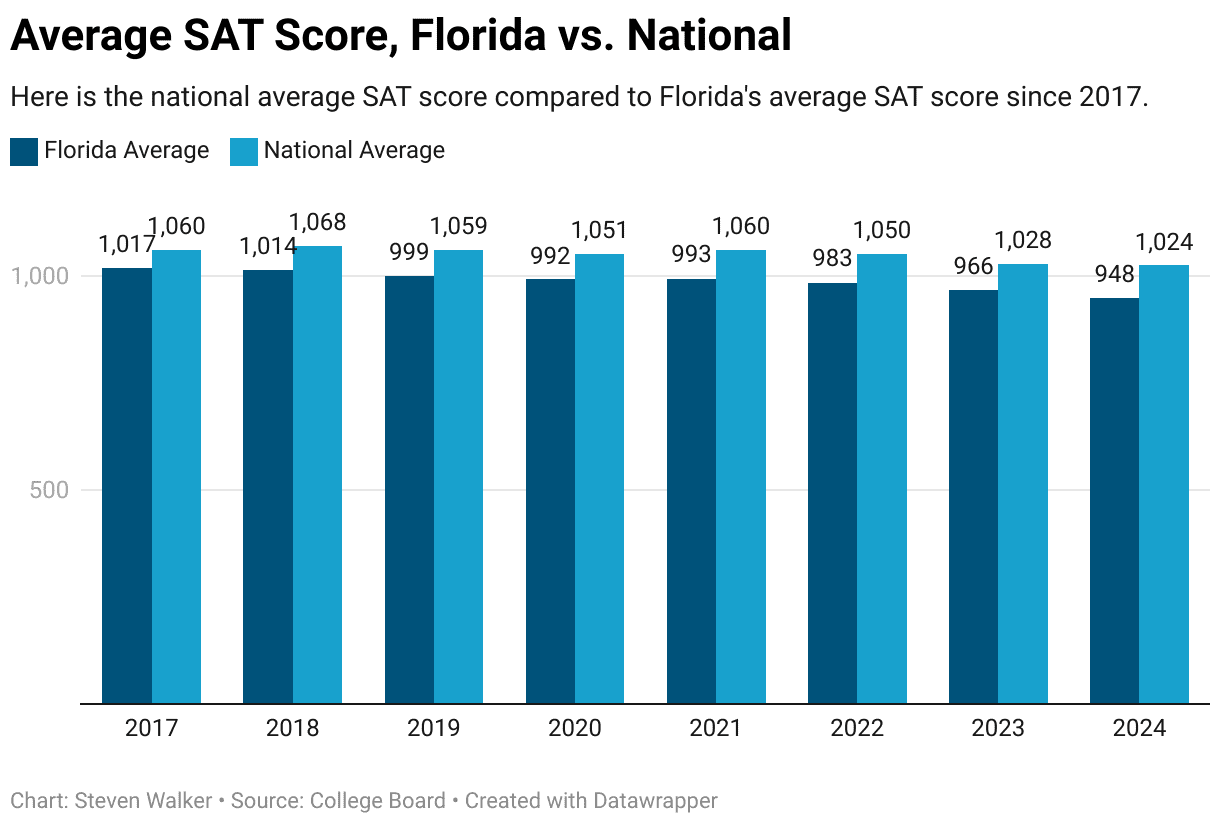
Florida SAT scores fall in 2024, continuing ‘COVID slide,’ experts say
Sun Sentinel | By Steven Walker | November 12, 2024
Scores on the ACT and other tests have dropped, too
Florida’s SAT scores fell again this year, continuing a downward trend that experts fear stems from the ongoing impact of the COVID-19 pandemic on state students.
The state’s average SAT score dropped to 948 out of 1600, an 18-point decline from 2023, according to recently released data from the College Board, makers of the SAT. The dip mirrors the national trend and represents the third year in a row that Florida SAT scores declined.
The state’s average is down from 1017 in 2017, the last comparable year because the College Board adjusted the SAT scoring scale.
Florida’s class of 2024 also took the SAT in larger numbers than the year before, and that likely is a factor in the decline as scores typically fall when the pool of test takers expands. Thousands of Florida students take the SAT to meet high school graduation requirements, as it is an alternative for those who haven’t passed state English and math exams.
“This is not the case is not the case in other states,” wrote Nathalia Medina, a spokesperson for the Florida Department of Education, in an email when asked to respond to the state’s scores.
But the College Board attributed this year’s drop to what many have called a COVID slide, and the ACT — which offers a rival college admissions exam — attributed falling scores on its test to the pandemic, too. Florida students’ scores on state and national math and reading exams also have decreased since 2020, when the pandemic shuttered schools, forced students online and then led to high absentee rates even when in-person classes resumed.
The COVID slide has been felt across the country, and Florida did more than many states to rush students back into classrooms.
Paul Cottle, a physics professor at Florida State University who tracks education issues, said he was most startled by Florida’s lower SAT reading scores this year since reading instruction has been a state focus since former Gov. Jeb Bush’s administration more than 20 years ago.
Florida’s 2024 high school graduates scored an average of 493 on the SAT reading/verbal section, down 10 points from 2023.
“That just struck me as an enormous change in a single year,” he said. “So not only are we still kind of crappy at math in this state, but our edge in English, reading and writing has started to erode.”
Florida’s SAT math score dropped eight points to 455, among the lowest for the ten states that, like Florida, test more than 90% of their graduating seniors.
The SAT is the most popular college admissions exam in Florida and a key test for many students as submitting a college admissions test is required when applying to any of Florida’s 12 state universities. Students also must score top marks on the SAT, ACT or CLT to qualify for the popular Bright Futures scholarship.
Florida students have struggled most acutely in math since the pandemic, according to both test scores and teachers.
The percentage of Florida SAT takers who are “college-ready” in math was 26%, fifth among the ten states that test 90% or more of their high school seniors.
The College Board defines “college-ready” as a 75% likelihood of achieving a C or higher in related first semester, credit-bearing college courses.
The percentage of Florida SAT takers who were “college-ready” in reading and writing fell five percentage points compared to 2023, down to 53%, according to the data.
 Grace Brown, an SAT and ACT test prep instructor with The College Map, an education consulting firm, has taught test prep classes since 2016.
Grace Brown, an SAT and ACT test prep instructor with The College Map, an education consulting firm, has taught test prep classes since 2016.
She said there’s been a significant gap in math understanding caused by COVID-19’s upending of classroom instruction, and tutors have to reteach pre-algebra and algebra 1 concepts — which students should know by the end of 9th grade — before helping them with the more advanced material, such as pre-calculus, that they’ll see on the SAT.
Brown said the COVID gap combined with more social media use seems to have hurt students’ academic achievement.
“On one side, you have this idea of the anxious generation, right? They’re too overloaded. They’re taking too many AP classes. They don’t have time,” Brown said. “Then on the other end, (there) could there be a COVID lag in effort.”
In Florida, 95% of high school graduates, about 230,000 students, took the SAT in 2024. In 2023, 90% of high school graduates, about 205,000 students, took the SAT.
Josh Cowen, a professor of education policy at Michigan State University, said the bigger group of students taking the SAT could be a reason for a drop in scores this year.
But he said an increase in private school enrollment driven by the expansion of Florida’s school voucher program — which provides scholarships to private schools — could play a factor, too, he said, as some students attend high schools of questionable quality.
“It’s not at all clear what they’re learning. Hasn’t been for a long time,” Cowen said. “The last decade has shown that, especially in STEM subjects, those kids aren’t doing very well on K-12 exams.”
Fewer Florida students in the class of 2024 took the ACT, about 106,000, but those who did also did worse that counterparts in previous years.
Florida, following a national trend, saw a decreased number of students reaching the ACT’s college-readiness benchmark on its four sections — English, math, reading and science, said Rose Babington, senior director of strategic initiatives at the ACT.
About 44% of the state’s ACT test takers did not hit any of the benchmarks for college readiness, according to ACT data. The state’s average ACT score, graded on a 36-point scale, has dropped a full point since 2018, and is now 19.
COVID-19’s impact played a major role in that downward trend, she said.
“If you’re looking at that five-year trend and sort of pandemic compared to post pandemic, we certainly would say that the pandemic was a contributing factor to declining scores,” she said.
The pandemic has impacted scores across demographics, but disproportionately students from lower-income families, minority students and those who would be first-generation college students were the hardest hit, Babington added.





